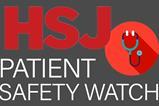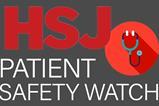HSJ is now hosting the Patient Safety Watch newsletter, written by Patient Safety Watch chief executive James Titcombe.
On 18 August, former neonatal nurse Lucy Letby was found guilty of a “cruel, calculated and cynical campaign” of seven murders and seven attempted murders of infants entrusted to her care at the Countess of Chester Hospital. There has been much said about what this means for an NHS confronting one of its darkest hours.
Alison Leary, professor of healthcare and workforce modelling at London South Bank University, warned in a British Medical Journal piece that the themes coming out of the Letby case had been seen many times before.
She wrote: “Frontline staff have concerns ignored or suppressed, NHS trust boards appear more concerned with potential reputational damage and financial performance than quality of care, growing staff shortages, a leadership apparently lacking in courage and integrity, and claims of an aggressive workplace culture.
“Although the malign influence of murder was the cause of deaths at the Countess of Chester, these reactions to patient safety issues could have been found in many inquiries of the last 50 years. So why are no lessons learned?”
Meanwhile, Sir Robert Francis KC, who led the Mid Staffs enquiry, told the Daily Telegraph in the wake of the Letby decision: “When things go majorly wrong it is not only about rogue individuals like Letby or Shipman, but a system which doesn’t value safety and prioritise patients. It’s when people aren’t listened to, that’s when bad things happen.”
And, in an interview with The Guardian, Parliamentary and health service ombudsman Rob Behrens said the case “raises questions yet again about a dysfunctional, adversarial culture in many NHS trusts, sub-optimal methods for reporting and investigating wrongdoing and unacceptable attitudes to whistleblowing and raising concerns”.
Stephen Brearey, the paediatrician who first raised the alarm about Ms Letby, told BBC Radio 4’s Today programme he wanted to see NHS executives regulated in a similar way to doctors and nurses. He told the broadcaster of his experience: “You go to senior colleagues with a problem and you come away confused and anxious because that problem is being turned in a way in which you start to realise they’re seeing you as a problem rather than the concern that you have.”
Dr Brearey also told the BBC that since Ms Letby’s conviction, he has been “deluged by emails and correspondence from clinicians… who have had similar experiences when they’ve raised patient safety concerns”. He said there was a “theme coming through” of clinicians raising concerns and “being put into mediation by senior managers”, adding: “It’s almost like weaponising that process.”
My view? Like so many others, I’ve found Ms Letby’s conviction almost too much to comprehend. When things go wrong in healthcare, most of the time, the people involved will have taken the actions they did based on what made sense to them at the time. The principle (which safety scientists call “local rationality”) underpins how safety investigations seek to make sense of what happened so recommendations can focus on system factors to make it less likely for the same circumstances to repeat.
Healthcare professionals have all the same human fallibilities as the rest of us, but we trust that they strive to provide the best care they can. Anything else is unthinkable.
But the unthinkable has happened before (Allitt, Shipman) and lessons from these infamous cases are supposed to have been learned.
The decision to put inquiry on a statutory footing is welcome and this will be the proper place to examine how and why these horrific crimes were allowed to occur. But we don’t need to wait for the outcome of the formal inquiry process to recognise change is needed.
A focus on the need for professional regulation for senior NHS managers is understandable. But we’ve also got to look at the role of the wider system in supporting NHS organisations and leaders to “problem sense” and to be open and transparent about safety issues and concerns.
As I wrote in the Guardian last week: “Healthcare, particularly maternity care, is complex. The measure of a safe and a well-run organisation isn’t one that purports to have no problems – it’s one that constantly seeks out safety issues and concerns, openly acknowledges and acts on problems and encourages and rewards everyone who plays a part in doing all of this to keep patients safe.”
Perhaps it’s time for a thorough examination of the leadership culture in the NHS to ensure all parts of the system pull in the same direction and the above sentiment becomes the norm?
In other news this edition…
Coventry NHS boss to keep job despite complaints being upheld
It has been reported an integrated care board chair is to keep her job, despite criticism from an independent inquiry.
Danielle Oum was found not to have always acted with honesty and integrity while she was chair of Birmingham and Solihull Mental Health Foundation Trust. She left that post last year, although continued on as Coventry and Warwickshire ICB chair.
A trust-commissioned report, carried out by JM King Associates, upheld 16 complaints made against her and found on some occasions her behaviours “exhibited a disregard for most of the Nolan Principles” and were “inconsistent with most of the values of the trust”.
NHSE has said it has reviewed the matter and continued to offer Ms Oum “its full support”.
One year since the commencement of Ockenden II
This week marks the one-year anniversary of the commencement of the Ockenden investigation into maternity services at Nottingham.
In an interview for Nottinghamshire Live, Ms Ockenden said the inquiry is now expected to finish in late 2025. The publication added more than 1,000 families have been told to expect a letter from the review in the coming weeks notifying them theirs had been identified as a case of concern and will be included in the inquiry unless they opt out.
Meanwhile, families affected by maternity failings at the trust have said they “expect action” against those responsible. They said in a statement: “To date, not a single person – clinical staff, managerial staff, board member, commissioner, governance lead – has been held to account for the known, avoidable and predictable failures.”
GPs seeing above safe level of patients on daily basis
A survey by Pulse, reported on by The Independent, has found GPs are in contact with 37 patients on an average day, far exceeding the limit of 25 the British Medical Association recommends to make sure “safe care” is delivered.
Commenting on the findings, Royal College of GPs chair Kamila Hawthorne said: “No two appointments in general practice are the same and patient contact numbers will vary depending on which clinical healthcare staff member is seeing the patient, practice and patient circumstances, and clinical judgement…
“However, there comes a point where demand exceeds capacity and GPs can no longer guarantee safe care to their patients, so we urgently need to find a range of solutions to this.”
Exodus of ambulance staff sparks safety concerns
Figures obtained by the Liberal Democrats, reported on by The Guardian, reveal nearly 7,000 ambulance staff have left their jobs in the past year, compared with around 4,500 in 2019-20.
Daisy Cooper, the political party’s health and social care spokesperson, said: “The shortage of NHS staff has caused untold pain for millions of people across the country, especially those left to wait for hours in pain for an ambulance to arrive.
“Paramedics perform heroics every day, but the pressures of a broken system are piling up. With warnings that the government is unprepared for the next winter crisis, ambulance services need help now.”
HSIB calls for ‘patient safety accountability framework’
The Healthcare Safety Investigation Branch has published a final report looking at delays in the handover of patient care from ambulance crews to emergency departments. The report brings together the findings from three interim reports and provides an update since they were published.
The review ultimately found such delays were causing patients harm. Additional findings from the national investigation include incidences of:
- Hospitals unable to accept new patients because they were full, despite a significant number of patients being medically fit for discharge and no longer needing to be there but were unable to be safely discharged to the right place of care – the review found this inability to discharge was a key contributor to problems with patient flow;
- Ambulance crews caring for patients in the back of their vehicles for more than 12 hours;
- Twice-daily reviews of patients on general wards to determine their suitability for discharge not taking place consistently, despite this being an expectation of the criteria to reside tool (a tool that helps clinicians determine appropriate discharge pathways).
The report makes significant recommendations, including that a patient safety accountability framework covering health and social care is created, to “help address the lack of accountability relating to patient safety risks”.
Important work from HSIB, let’s keep an eye on what happens to the recommendations.
National safety warning on risk of death from entrapment or falls
A new national patient safety alert was issued this week following analysis of reports to the Medicines and Healthcare products Regulatory Agency involving “deaths and serious injuries from entrapment or falls relating to medical beds, bed rails (also known as bed safety rails), trolleys, bariatric beds, lateral turning devices and bed grab handles”.
According to investigations, deaths were found to involve factors including inadequate risk assessment, maintenance issues and children and adults of small stature using beds designed for use by adults with typical body dimensions.
The alert requires NHS organisations to undertake seven actions, beginning as soon as possible and to be completed by 1 March 2024.
Sharing some good stuff…
In a newsletter that’s been full of some difficult stories, the final share for this edition is on a much more positive and uplifting note. Award-winning dementia campaigner, Pippa Kelly shared with me a fantastic podcast featuring Richard Oakley, the Alzheimer’s Society’s associate director of research. The podcast discusses the arrival of two new immunotherapy drugs, Lecanemab and Donanemab, which are shown to have slowed the decline in memory and cognition of people with early-stage Alzheimer’s disease by up to 40 per cent.
It’s an inspiring and hopeful listen, and a reminder of the brilliant work people are doing to alleviate suffering and improve lives – what the NHS truly stands for and what the vast majority of caring healthcare professionals go to work each day to do.
That’s all for this edition. Please look out for our next newsletter in two weeks’ time.
Thanks for reading and please stay safe.
James Titcombe
































No comments yet